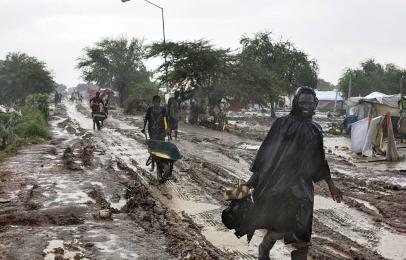More than 40,000 people get food aid in Malakal: UNOCHA
February 3, 2016 (JUBA) – The United Nations Office for the Coordination of Humanitarian Affairs, OCHA, said it distributed food to over 40,000 people with 8,600 children receiving supplementary feeding in South Sudan’s Upper Nile capital, Malakal.

“In Malakal town, partners have distributed food to more than 4,600 people, along with water purification tablets and other basic sanitation supplies,” Haq said in a statement.
Efforts are also ongoing to re-establish health and nutrition services in Malakal town, he added.
Last week, a top UN official called on all parties to the conflict to protect civilians and grant safe and unhindered humanitarian access by aid agencies in the young nation.
Kyung-wha Kang, the deputy humanitarian chief, made these remarks during her recent visit whereby she accompanied UN Secretary-General Ban Ki-moon to South Sudan.
During her visit to South Sudan, Kang met humanitarian partners, the diplomatic community and visited Malakal, where she witnessed the devastating impact of the armed violence that took place on 17 and 18 February in the UN protection of civilians’ site.
“I am outraged by what I have seen in Malakal,” said Kang, citing killings of civilians at the UN site in Malakal as well as destruction of medical clinics and schools in the region.
“Those responsible for these heinous acts must be held to account,” she urged.
Tens of thousands of people were killed and millions displaced since the outbreak of the South Sudan conflict. In recent weeks, however, fighting has spread to new areas, including in Wau and Mundri, amidst continued reports of people being raped and killed, and of homes and crops being destroyed and damaged during the violence.
Civilians in the country, Kang said, continue to face destitution, destruction, death and devastation, and the humanitarian needs continue to grow, in spite of a peace agreement the two rival South Sudanese leaders signed in August last year.
She appealed to the international community to act immediately to avert an even greater tragedy in South Sudan, as humanitarian needs are higher now than ever.
South Sudan Humanitarian Response Plan for 2016 is reportedly only 6.5 per cent funded, including the $21 million of Central Emergency Response Fund allocation announced by the Secretary-General on 25 February, leaving a gap of $1.21 billion.
About $220 million, the UN said, is urgently needed to ensure that vital supplies are procured and delivered during the dry season, before the country becomes unreachable by road.
(ST)
